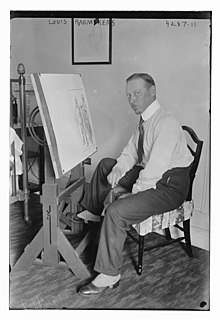Louis Raemaekers
| Louis Raemaekers | |
|---|---|

Raemaekers on July 28, 191
|
|
| Born |
April 6, 1869 Roermond, Netherlands |
| Died | July 26, 1956 (aged 87) Scheveningen, Netherlands |
Louis Raemaekers (April 6, 1869 – July 26, 1956) was a Dutch painter and editorial cartoonist for the Amsterdam newspaper De Telegraaf during World War I, noted for his anti-German stance.
He was born and grew up in Roermond, Netherlands during a period of political and social unrest in the city, which at that time formed the battleground between Catholic clericalism and liberalism. Louis’ father published a weekly journal called De Volksvriend (Friend of the People) and was an influential man in liberal circles. His battle against the establishment set the tone for his son’s standpoint several decades later, when he fought against the unjust and horrendous occupation of neutral Belgium at the start of the First World War. His mother was of German descent. He was trained – and later working – as a drawing teacher and made landscapes and children's books covers and illustrations in his free time. In 1906 his life took a decisive turn when he accepted the invitation to draw political cartoons for leading Dutch newspapers, first from 1906 to 1909 for the Algemeen Handelsblad and from 1909 onwards for De Telegraaf.
Immediately after the Germans invaded Belgium, Louis Raemaekers became one of their fiercest critics. His message was clear: the Netherlands had to take sides for the Allies and abandon its neutral stance. His graphic cartoons depicted the rule of the German military in Belgium, portrayed the Germans as barbarians and Kaiser Wilhelm II as an ally of Satan. His work was confiscated on several occasions by the Dutch government and he was criticized by many for endangering the Dutch neutrality. The minister of Foreign Affairs John Loudon invited Raemaekers, the owner of De Telegraaf H.M.C. Holdert and the editor-in-chief Kick Schröder under pressure from the German government to a meeting, at which he requested them to avoid ‘anything that tends towards insulting the German Kaiser and the German army’. It was not possible to prosecute Raemaekers for as long as the country was not under martial law. But the pressure on him continued, also from Germany: in September 1915 the rumor even started circulating that the German government had offered a reward of 12,000 guilders for Raemaekers, dead or alive, but proof of an official statement has never been found.
...
Wikipedia
